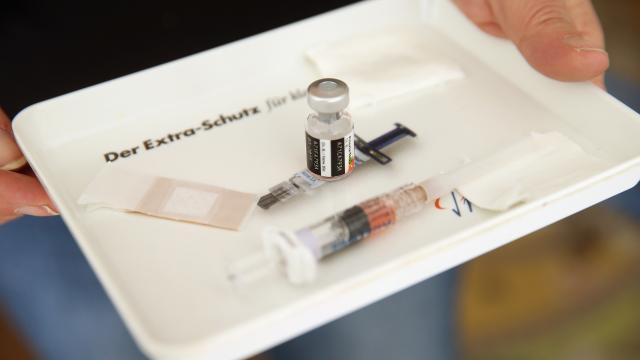We’re on track for a record-breaking measles season.
Ever since the disease was basically eliminated from the first world countries in the world in 2000, there have been a few cases each year from outbreaks sparked by travellers. As this year’s case count rises above 600, you may be wondering: can I trust my childhood measles vaccine? Did I even get my childhood measles vaccine?
Children are supposed to get a shot of the measles vaccine (delivered as the MMR, or measles-mumps-rubella vaccine) just after they turn a year old. A few kids’ immune systems won’t be totally ready at that age—in which case the vaccine won’t take—so everybody is supposed to get a booster shot around the time they start kindergarten.
Why your old vaccine might not be good enough
The measles vaccine first became available in 1963, and for a few years there were two different vaccines. The version with live, weakened measles virus is still used today.
A different shot, with killed virus, was introduced around the same time but discontinued in 1967 because it was not as effective.
If you got the less-effective vaccine, the recommendation is to get a second dose, this time with the live vaccine. (It’s possible you got that extra shot back when you were a kid.)
In 1989, the CDC began recommending that even kids who got the regular vaccine should still get a second shot—because, remember, it doesn’t work on everybody the first time. One dose is 93 per cent effective; with both doses, effectiveness goes up to 97%.
How to know if you need a new shot
As we’ve discussed before, you can always check your vaccination records (if you can find them) and, when in doubt, ask your doctor for advice.
In most cases, they’ll recommend the same thing the CDC is saying, which is to make sure you’ve gotten at least one dose of the live vaccine, and in some cases they’ll recommend two. Here’s the CDC’s breakdown:
You don’t need a vaccine if…
-
You know you’ve had measles
-
You were born before 1957 (back then, everybody got measles)
-
You’ve had a lab test that shows you’re immune to measles
If you know you’ve had one dose of the measles/MMR vaccine on schedule, that’s enough if…
-
You’re a preschool-aged child (because you’ll get the second dose around the time you start school)
-
You’re an adult who is at low risk of being exposed to measles
You should get a second dose if:
-
You’re a school aged kid
-
You’re an adult who travels, works in health care, takes public transport, attends university, or is otherwise at high risk of being exposed to measles
If you don’t know your status, get the shot anyway. The CDC states that there is “no harm in getting another dose of the MMR, even if you are already immune to measles.”
The above advice applies to almost everyone, but there are some people who should not get the shot. If you are pregnant, or if you or a family member have a weakened immune system due to an immune disorder or chemotherapy, the vaccine carries risks that may outweigh the benefits.
(The CDC’s full list of contraindications is here.) Don’t assume, though — discuss the risks with your doctor to figure out what’s right for you.

Comments